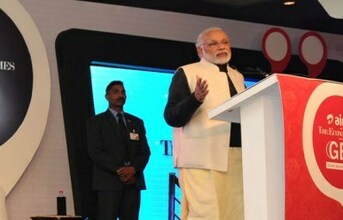
Many experts have commented on the need to reduce subsidies. The new universal access to banking through the Jan Dhan Yojana, has enabled plugging of huge leakages in subsidies. In developing countries, fuel subsidies are generally very difficult to tackle. We have successfully decontrolled cooking gas prices.
We are now operating the world's largest direct benefit transfer scheme for cooking gas. Subsidies are transferred to the bank account of households. Through electronic verification, multiple and bogus connections are eliminated. This enables genuine beneficiaries to get what they deserve while eliminating those who are not eligible. This has substantially reduced the subsidy.
Another subsidized fuel is kerosene, used by the poor for cooking and lighting, and distributed by state governments. There is clear evidence that a large quantity of subsidized kerosene is misused and diverted. We have begun a pilot in thirty three districts where kerosene will be sold at market prices. The difference between market price and the subsidized price will be transferred directly to bank accounts of those who are poor.
The poor will be properly identified through bank accounts and biometric identification through Aadhaar. This will eliminate duplicate, non-eligible and bogus consumers. This elimination will reduce the total subsidy. We have decided that 75% of the savings from this will be passed on to the states. Thereby, we have encouraged state governments to implement this in all districts.
The experience of Chandigarh, shows that this is possible. In April 2014, there were 68,000 beneficiaries of subsidized kerosene in Chandigarh. A campaign was launched to issue gas connections to all eligible families. 10,500 new gas connections were issued. Kerosene quotas were stopped for 42,000 families who already had gas connections. By 31st March, 2016, Chandigarh will be declared kerosene-free. Believe it or not, till date, the saving achieved in kerosene consumption through this initiative is 73%!
Two days ago at a meeting with Chief Secretaries of the States, I was reviewing implementation of various pension schemes. I was pleasantly surprised to see that there had been noteworthy reduction in leakage, simply by eliminating those who were double counted and who were ineligible. In some states, a reduction of 12% in subsidies has been achieved without any harm to the poor.
Another major subsidy is on fertilizer. A substantial quantity of subsidized urea is diverted illegally to use in the production of chemicals. We have introduced a simple but effective technical solution: neem-coating of urea. The organic neem coating makes the fertilizer unsuitable for diversion. We have now achieved 100% neem coating in both domestic and imported urea. A significant side benefit has also happened. The collection of neem leaves for urea has become a new income earning opportunity for rural women.
I know that several of you are economists. Economists generally believe that human beings are rational. They believe people will not give up a benefit for which they are entitled.
Last year, I gave a call to citizens. I asked them to give up their cooking gas subsidies, if they felt they were not poor enough to get it. We also made a promise. Every connection given up, would be used to give a new gas connection to a poor family. Poor women in rural India use firewood or biomass and suffer greatly because of smoke. This scheme is entirely voluntary. You may be surprised to learn that nearly 6.5 million people in India have responded to my call. It warms my heart, to see that so many of them have come forward, with no compulsion to benefit the poor and give up their subsidies. Already, over 5 million new connections have been given to the poor. It is a sign of the public spirit and the self-respect which prevails among Indians and shows the potential of citizen action. Another example where citizens have responded is in the case of Khadi. In October 2014, I had appealed to all Indians to buy at least one Khadi garment. In response, Khadi sales have increased substantially.
We have taken a creative approach to tackling the problem of loss making power distribution companies. Under the UDAY programme, short term debt relief is given by state governments taking over bank loans. But this is accompanied by strong long term conditions to hold both the distribution companies and the states. This will create the conditions for rolling out 24x7 power supply.
Our country suffers from an excess of old and unnecessary laws which obstruct people and businesses. We began the exercise of identifying unnecessary laws and repealing them. 1,827 Central laws have been identified for repeal. Out of these, 125 have already been repealed. Bills for repealing another 758 have been passed by the Lok Sabha and are awaiting the approval of the Upper House.
I have given just a few examples of the potential of improved governance. The benefits of improved governance and reduced corruption are lasting and profound. If our policies are studied closely, you will find that many are popular, but none are populist. Every one of the changes we have made is in the direction of good governance and rationality.
(Continued on the next page)


























